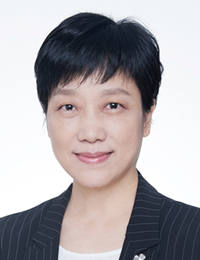HUANG Lei

HUANG Lei
full professor
E-mail: leihuang@shsmu.edu.cn
Tel: 63846590-776576
Laboratory of Genes and Signal Pathways Related to Tumor Initiation
Research Field
Much of our effort focuses on understanding the mechanism of cancer initiation and uncovering targets for cancer therapy. The goals of our research are: (1) understanding the role of the oncoprotein MUC1 in tumorigenesis and therapy, particularly in breast cancer, lung cancer and esophagus squamous cell carcinoma (ESCC); (2) exploring the mechanism of how MUC1 is activated and degraded; (3) developing MUC1 as a prognostic and predictive marker to guide the application of tumor therapeutic.
Personal Introduction
Professor Lei Huang is the vice director of the Department of Histoembryology, Genetics and Developmental Biology, Shanghai Jiao Tong University School of Medicine, PI of the Key Laboratory of Cell Differentiation and Apoptosis of the Chinese Ministry of Education, and the Shanghai Key Laboratory of Reproductive Medicine. Much of her effort focuses on understanding the mechanism of cancer initiation and uncovering targets for cancer therapy. The goals of their research are: understanding the role of the oncoprotein MUC1 in tumorigenesis and therapy, particularly in breast cancer, lung cancer and esophagus squamous cell carcinoma (ESCC); exploring the mechanism of how MUC1 is activated and degraded; developing MUC1 as a prognostic and predictive marker to guide the application of tumor therapeutic. More than 40 research papers have been published in STTT, Cancer Research, Oncogene, PNAS and other journals.
DEGREES
Ph.D., Medical Genetics, Xiangya Medical School, P. R. China, 2000
M. S., Medical Genetics, Xiangya Medical School, P. R. China, 1997
B.A., Biology, Hunan Normal University, P. R. China, 1991
EMPLOYMENT HISTORY
2017.9-present Professor, Department of Histoembryology, Genetics and Developmental Biology, Shanghai Jiao Tong University School of Medicine, Shanghai.
2012.6-2017.9 Professor, Department of Pathophysiology, Shanghai Jiao Tong University School of Medicine, Shanghai.
2007.3-2012.5 Professor, Department of Medical Genetics, Shanghai Jiao Tong University School of Medicine, Shanghai.
2001.6-2007.2 Postdoc /Research Associate in Medical Oncology, Dana-Farber/Harvard Cancer Center, Harvard University, Boston, MA 02215-5450
2000.7-2001.5 Associate professor National Lab. of Medical Genetics of China, Xiangya Medical School, P. R. China.
1997.10-2000.7 Lecturer National Lab. of Medical Genetics of China, Xiangya Medical School, P. R. China.
1991.6-1997.9 Assistant Researcher National Lab. of Medical Genetics of China, Xiangya Medical School, P. R. China.
Scientific Research Projects
2021.01-2024.12, NNSFC (82073111), Significance of ubiquitination and control of the MUC1 for tumor therapy.
2021.08-2024.7, Science and Technology Commission of Shanghai Municipality (21S11901600), Discovery of MUC1-targeted antitumor compounds from deep-sea microorganisms.
2019.01-2022.12, NNSFC (81874197), The mechanism and clinical significance of MUC1 regulation on cancer stem cells division.
2015.1-2018.12, NNSFC (81472461), The role of MUC1 in breast postpartum involution and TNBC development.
2013.1-2016.12, NNSFC (81272262), Mechanism study of MUC1 in lung cancer early stgetumorigenesis and metastasis.
2011.1-2013.12,NNSFC (81071666), Establishment and study of MDMX knock in mouse model.
2009.1-2011.12, the New Century Excellent Talents in University and the SRF for ROCS of State Education Ministry (NCET-08-0349), The role of MUC1 in lung cancer therapy.
2009.1-2011.12,NNSFC (30871363), The role of MUC1 in breast carcinogensis
2007.9-2009.9,the Shanghai Pujiang Program (07pj14065), The role of MUC1 in tumorigenesis and therapy of lung cancer.
2007.1-2009.12,NNSFC (30671169), Establishment and application of MUC1 transgenic mouse model.
(NNSFC: National Natural Science Foundation of China)
Selected publications
Pang Z#, Dong X#, Deng H#, Wang C, Liao X, Liao C, Liao Y, Tian W, Cheng Jinke, Chen G, Yi H* and Huang L*. MUC1 triggers lineage plasticity of Her2 positive mammary tumors. Oncogene. 2022;41(22):3064-3078.
Liao C, Yu L, Pang Z, Deng H, Liao X, Li S, Cheng J, Qi M*, Chen G* and Huang L*. WWP1 targeting MUC1 for ubiquitin-mediated lysosomal degradation to suppress carcinogenesis. Signal Transduction and Targeted Therapy. 2021; 6(1):297, 2624-2627
Guan Y, Wang Y, Li B, Shen K, Li Q, Ni Y* and Huang L*. Mitophagy in carcinogenesis, drug resistance and anticancer therapeutics. Cancer Cell International. 2021; 21 (350):1-9.
Lv Y, Cang W, Li Q, Liao X, Zhan M, Deng H, Li S, Jin W, Pang Z, Qiu X, Zhao K, Chen G, Qiu L*, Huang L*. Erlotinib overcomes paclitaxel-resistant cancer stem cells by blocking the EGFR-CREB/GRβ-IL-6 axis in MUC1-positive cervical cancer. Oncogenesis. 2019;8(12):70.
Wu AY, Gu LY, Cang W, Cheng MX, Wang WJ, Di W, Huang L*, Qiu LH*. Fn14 overcomes cisplatin resistance of high-grade serous ovarian cancer by promoting Mdm2-mediated p53-R248Q ubiquitination and degradation. J Exp Clin Cancer Res. 2019; 38 (1):176. (*,co-corresponding author)
Wang Y, Liao X, Ye Q, Huang L*. Clinic implication of MUC1 O-glycosylation and C1GALT1 in esophagus squamous cell carcinoma. Sci China Life Sci. 2018; 61(11):1389-1395.
Gamze Kuser-Abali, Lu Gong, Jiawei Yan, Qingqing Liu, Weiqi Zeng, Amanda Williamson, Chuan Bian Lim, Mary Ellen Molloy, John B. Little, Lei Huang and Zhi-Min Yuan. An EZH2-mediated epigenetic mechanism behind p53-dependent tissue sensitivity to DNA damage. Proc Natl Acad Sci U S A. 2018;115(13):3452-3457.
Ning N, Yu Y, Wu M, Zhang R, Zhang T, Zhu C, Huang L, Yun CH, Benes CH, Zhang J, Deng X, Chen Q, Ren R. A Novel Microtubule Inhibitor Overcomes Multidrug Resistance in Tumors. Cancer Res. 2018; 78(20):5949-5957.
Li Y#, Pang Z#, Dong X, Liao X, Deng H, Liao C, Liao Y, Chen G, Huang L*. MUC1 induces M2 type macrophage influx during postpartum mammary gland involution and triggers breast cancer. Oncotarget. 2017; 9(3):3446-3458.
Jin W#, Liao X#, Lv Y, Pang Z, Wang Y, Li Q, Liao Y, Ye Q, Chen G, Zhao K*, Huang L*. MUC1 induces acquired chemoresistance by upregulating ABCB1 in EGFR-dependent manner. Cell Death & Disease. 2017:8(8):e2980.
Fu RJ, He W, Wang XB, Li L, Zhao HB, Liu XY, Pang Z, Chen GQ, Huang L*, Zhao KW*. DNMT1-mediated hypermethylation of Krüppel-like factor 5 regulates the progression of clear cell renal cell carcinoma. Cell Death & Disease. 2017; 8(7):e2952. (*,co-corresponding author)
Hu Y#, Li D#, Wu A, Qiu X, Di W, Huang L*, Qiu L*. TWEAK-stimulated macrophages inhibit metastasis of epithelial ovarian cancer via exosomal shuttling of microRNA. Cancer Lett. 2017; 393:60-67. (*,co-corresponding author)




